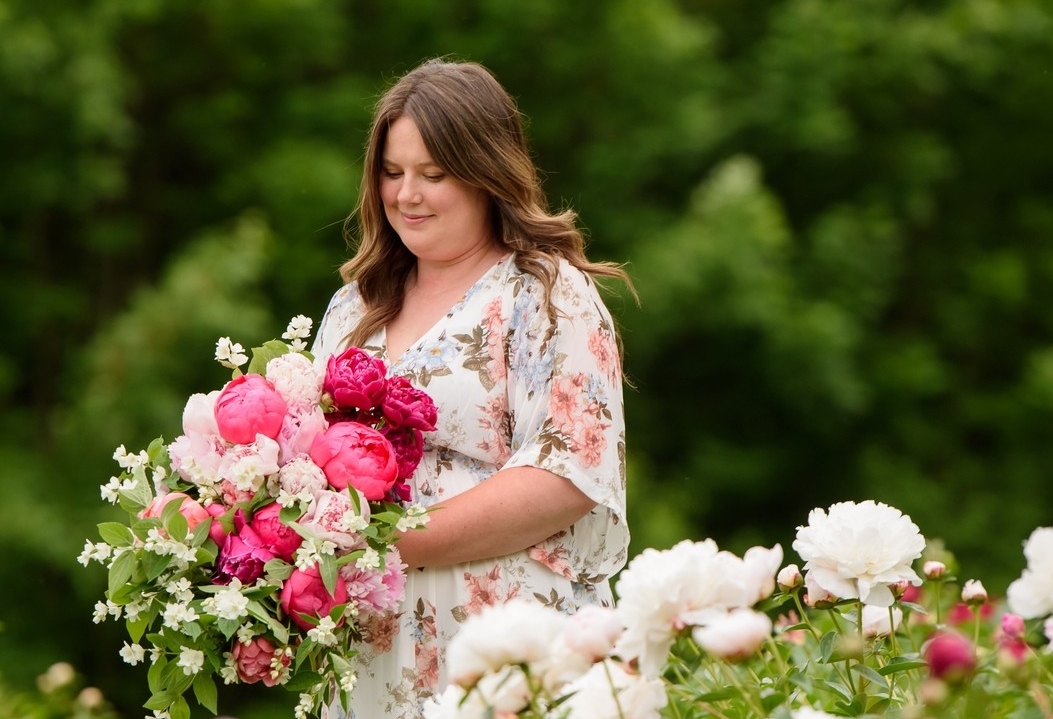Flower power: How a Concordia grad is growing success with peonies
 “I like to keep the history going. Canada has a strong peony culture — not everyone knows that.” says Kate-Lynn Clark, owner of En Fleurs flower farm.
“I like to keep the history going. Canada has a strong peony culture — not everyone knows that.” says Kate-Lynn Clark, owner of En Fleurs flower farm.
When Kate-Lynn Clark, BA 17, graduated from Concordia in human environment and biology, she had no idea she would be running a peony enterprise just a few years later. Today, she’s the owner-operator of En Fleurs, a flower farm based in Brownsburg-Chatham, Que.
It all started with a leap of faith and a summer job.
After a brief stint with Canada Post, Clark longed for work that would connect her with nature. She came across a job listing for a horticultural assistant at Pivoinerie D’Aoust in Hudson, Que., and applied.
“The great thing about a degree in geography is that it gives you a broad understanding of how the physical world works and how humans interact with it,” says Clark. “The biology minor gave me a greater grasp of the environment.”
What she didn’t know about were peonies.
“When they started blooming that spring — I think there were 1,000 different varieties — I thought, ‘Whoa, what is all this?’” she recalls.
She soon learned that each cultivar had its own history, and the hybridizers — those that create new varieties — did, too. Clark quickly immersed herself, memorizing all of them, joking that she’d undergone “four years of intensive peony school.”
Her efforts paid off. In 2020, founder Lindsay D’Aoust was looking to retire and needed a successor. She offered to sell her stock to Clark.
“At the time, I asked her, ‘Why me?’ She said it was because I reacted well to her four dogs,” Clark laughs.
‘Each peony has a story’
Clark relocated the farm to her family’s land in Brownsburg-Chatham — a property that has been in her family since 1832, when her Scottish ancestors settled there.
As an eighth-generation farmer, Clark is proud to carry on that heritage, while also acknowledging the land’s deeper history on the traditional territories of the Omàmìwininìwag (Algonquin), Anishinabewaki and Kanienʼkehá:ka (Mohawk) peoples.
The move required great care: every root dug up, washed, packaged and labelled to preserve hundreds of cultivars. Today, En Fleurs offers nearly 500 cultivars, many historic or rare.
“Peonies are special because they tie the physical world to culture, and each one has a story,” Clark says.
She now sells her peonies across North America, with fall being her busiest season. It’s when she harvests and ships roots — and it’s the best time to plant peonies, while they’re dormant and before the ground freezes.
“I didn’t expect our business to grow so quickly,” Clark admits.
Cultivating a legacy
Sustainability is central to Clark’s work. The farm relies on hand weeding, using compost instead of fertilizers and no irrigation. Peonies’ natural hardiness makes them well suited to Quebec’s climate — even in a dry summer, they thrive.
Clark also sees herself as a custodian of Canadian peony culture. Her collection includes cultivars of national significance, and she’s committed to keeping those stories alive.
“I like to keep the history going,” she says. “Canada has a strong peony culture — not everyone knows that.”
Looking ahead, Clark hopes to develop her own cultivars and expand En Fleurs’ offerings of woody peonies — a more unusual variety that requires grafting. She remains close with D’Aoust, who has become a family friend and collaborator.
Together, they continue to share knowledge and explore new possibilities for the farm. “We’re the only people grafting locally grown woody peonies in Canada,” Clark notes, adding that she also hopes to expand her collection of herbaceous varieties even further.
“This wasn’t something I ever imagined doing, but it feels right,” she says. “I’m proud of how far we’ve come.”

